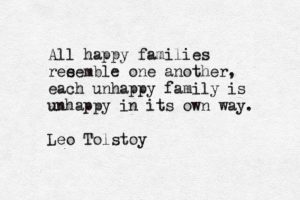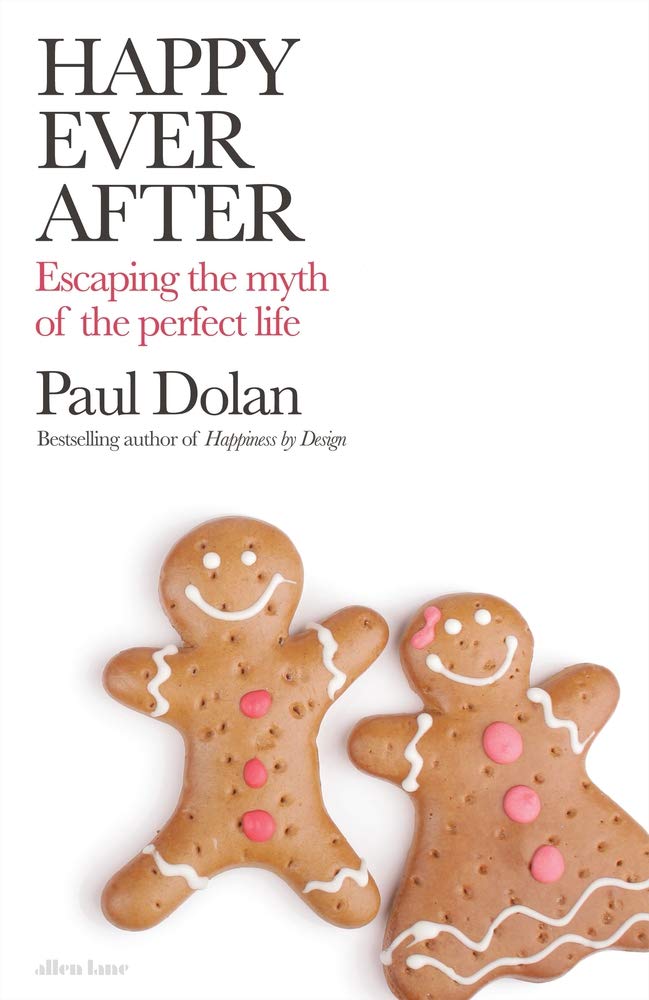Behavioural scientist Paul Dolan in his new book Happy Ever After: Escaping the Myth of the Perfect Life by Paul Dolan (out 17 January 2019) challenges the ‘success’ indicators of modern myths as narratives and narrative traps:
Myth: expectation to be ambitious, wealthy, successful and well educated, married, monogamous and have kids. These are guidelines “for behaviour, and they might sometimes make us happier, too.”
Fact: They are “stories – and ones that may not have originated with present-day people in mind. As such, many of these stories end up creating a kind of social dissonance whereby, perversely, they cause more harm than good.”
Wealth and Income
Myth: The more money you have the happier you’ll be. You need to be a millionaire.
Fact: You have to aim to make just enough. If you have everything already, then you have everything already.
Summary: According to the research, happiness goes up with increases in income at the lower end of the scale, but then it falls with higher incomes.
If you earn less than £20K you’ll be pissed off. If you earn over £50K pounds you will also be pissed off. Basically because you have more than twice the responsibility of the person earning £20K.
Work and Career
Myth: “A job that makes us miserable is not a good job, but we can convince ourselves it is if it has high status.”There is a very common inner conflict between the success narrative, which values status and recognition in a job, and personal experiences of happiness.
Fact: Those who choose floristry or fitness might be happier to begin with than those who choose to go into law. “We need good longitudinal studies (which follow the same people over time) to find out more. We might expect that many of those choosing careers as lawyers care more about what others think of them than those who choose careers analogous to being “just a florist”.”
Summary: Some jobs are “happier” than others (shorter hours for example, lower pay, but being outside or active more)
Love and Marriage
Myth: “Passionate love to be nothing but pleasurable
Fact: can be quite damaging, just like any other compulsion
Myth: Passionate love must last forever
Fact: ‘Honeymoon period’ dies after a year.
Myth: Your spouse will satisfy all your needs.
Fact: No human being can.
Summary: “ …and they fell in love, got married, and lived happily ever after.” The fairytale endings are seared into our conscious and subconscious. An overwhelming majority of us report considering marriage as part of our ideal lifestyle and we often project this preference on to others, too. An unmarried 40-year-old is “unlucky” or has yet to meet “the one”: as if being married is something for all of us, and that there is some one – one person – out there for every one of us.”

Children
“Those born into high-conflict relationships report greater happiness as adults if their parents split up compared to those whose parents stayed together.”
When a relationship (long or short) ends, it is deemed to be a waste or a sad event. But if they were happy then why did it end? A breakup can and will benefit both parties. Two in five marriages in the UK end in divorce. He says that the “happy ever after” myth is overoptimistic and children and teenagers need to be educated about that while they are still young and impressionable so as to open their eyes to the world that is not Disney, otherwise you could end up being unhappy ever after.
Swearing
“Swearing is only ever harmful when it is used in an aggressive or abusive way, and not when used as a means of conveying excitement and emphasis. In these circumstances, the evidence shows that it does more good than harm, so the idea that swearing is bad is a fucking stupid one.”
Summary: Paul Dolan is a working class kid who was the first person in his family to go to university. He became a university professor and has had an illustrious and scholarly career in behavioural science with top universities of the world. He studied economics at Swansea before moving into the field of behavioural science at the University of York. A former visiting scholar with Professor Daniel Kahneman, the bestselling author of Thinking, Fast and Slow, at Princeton university, Dolan held posts at the universities of York, Newcastle, Sheffield and Imperial College London before joining the LSE. He cites an incident where a man in his 50s told him off for swearing twice during an hour long panel discussion. He feels he should have the freedom to be able to say ‘fuck’ if and when he wants to during lectures or whenever else.
“Dolan says he finds happiness in his work, going to the gym, evenings out with friends, having new experiences, talking to taxi drivers… What makes him unhappy? Other people’s weddings, reading novels and overlong family holidays, he says. He concludes: “I am a very lucky man: not because I have a great job and family and all that stuff but because I have a sunny disposition. Now that makes me happy.”
Conclusion
I think he is likely to be a likeable, nice guy who does not care about the boundaries of social status. Be like Paul. “Do your thing. Be happy. Fuck’em!”

Ivy Ngeow was born and raised in Johor Bahru, Malaysia. She is of Malaysian Chinese origin and the author of two novels. Cry of the Flying Rhino (Proverse Hong Kong), winner of 2016 International Proverse Prize, is her debut set in Malaysia and Borneo. Her second novel Heart of Glass (Unbound UK) was set in Chicago and Macau. She is fond of margaritas, seafood tacos, Americana and all things vintage. She lives in London and is in her ‘third culture’.
#heartofglass #cryoftheflyingrhino Tweet me: @ivyngeow
